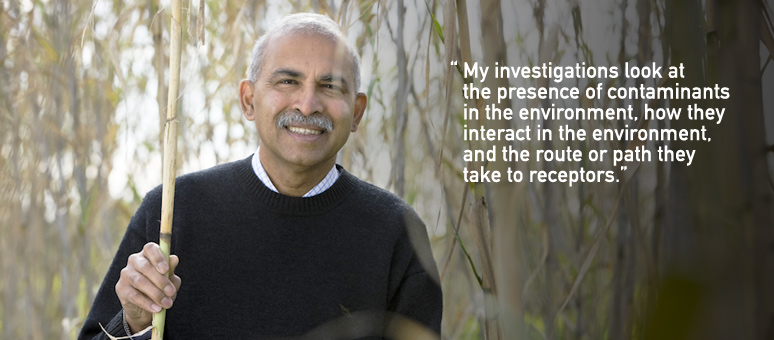Researcher Highlights
Remediation and Risks: a world without contamination
Professor Ravi Naidu
Professor Ravi Naidu is a global leader in contamination studies, studying agricultural and industrial impacts on the environment.

His research has led to the implementation of policy directives for governments and new technology to manage and remediate polluted groundwater and soil, both in Australia and abroad.
Ravi is also the Managing Director of the Cooperative Research Centre for Contamination, Assessment and Remediation of the Environment (CRC CARE), an independent organisation that performs research, develops technologies and provides policy guidance for assessing, cleaning up and preventing contamination of soil, water and air. At the University of Newcastle, Ravi leads the Global Centre for Environmental Remediation (GCER), where he continues to implement his vision to safeguard the environment for future generations.
Shaping the world
As science speeds forward, Ravi acknowledges that public policy doesn't always keep up. With more than two decades working in the field of contaminants, including an esteemed chief investigator role with Australia's Commonwealth Scientific and Industrial Research Organisation (CSIRO), Ravi has made extensive contributions to national and global paradigms of risk assessment and remediation of contaminated sites.
"I have spent a lot of time developing a consensus amongst industry, regulators, Environmental Protection Authorities and researchers relating to contaminants," Ravi points out.
"As well as to remediate sites, a lot of work is required on the policy front."
"When I began my career, there was no remediation industry; my work has led to an exponential increase in the number of people working in remediation," Ravi states humbly.
This industry is now worth $3 billion dollars annually and employs thousands of people.
A systems-based approach to risk
Focusing on two broad categories, Ravi's meticulous analyses investigate contaminants from agriculture and industry and their relationships with receptors.
"The receptor could be the environment, or human," Ravi says.
"My investigations look at the presence of contaminants in the environment, how they interact in the environment, and the route or path they take to receptors."
"Initially the focus of our work was on agriculture," Ravi observes.
"But many of the industrial activities over the past 50 years have led to significant contamination of the environment."
"Now the focus of our investigations – to a very large extent – is industrial contaminants and this is largely driven by the industries themselves."
Ravi's approach to this work has been to adopt whole-of-system inquiries to ensure the risks of contaminants are fully assessed and managed, whether they are in soil, groundwater or the urban environment.
"When assessing a contaminated site you assess the receptors, what the pathways to those receptors are, and what needs to be done to minimise exposure," Ravi confirms.
Ravi notes the importance of this, given the severe health effects of some contaminants such as asbestos, arsenic, cadmium and mercury.
The Professor's approach is seeing GCER develop a new model in conjunction with CRC CARE to quantify risk posed by on-site contaminants.
"Until recently, the predictive tool that has been used to assess risk - and which is still being used - is a database based on a lot of assumptions."
"Whenever you use assumptions, the output from the predictive tool can be quite conservative, and conservatism means you might end up remediating sites which do not require it."
"This new model will minimise uncertainties and save a lot of money for industries."
CRC CARE and GCER: caring and sharing knowledge
CRC CARE began in 1999 when Ravi initiated dialogue with industries and government departments dealing with contaminants.
"It took four years for industries to appreciate there was a need for a national Centre of Excellence to become a one-stop shop for contaminants."
The Centre, which brings together major companies, government departments and Environmental Protection Authorities, was established in 2005 by a competitive bid to the Commonwealth and is on track to become a Centre of Excellence beyond the year 2020.
In 2015, the University of Newcastle invited Ravi to be Global Innovation Chair and Director of GCER.
"GCER reaches organisations in Australia and beyond from a capacity-building perspective," Ravi notes.
This entails training students as well as developing solutions for complex contamination problems.
"CRC CARE and GCER are safeguarding a clean environment for future generations," Ravi attests.
"Satisfaction is knowing you have helped train people who are able to clean up the mess we have created and prevent future degradation of our environment."
Technology targeting toxins
Ravi has patented seven technologies to safeguard the environment and human health, including a product to remediate the toxic chemicals left behind by firefighting foams.
"No technology was available to help clean up wastewater and impacted soil, generated by firefighters when they train," Ravi declares.
"CRC CARE developed a new patented technology to fix this, utilising a naturally occurring material modified with a nontoxic chemical."
"This product can irreversibly and selectively capture toxic substances present in wastewater."
"Thus, the water that comes out is clean because of our filtration processes."
The technology is being scaled up for field applications with plants operating at a number of remediation sites.
Proactive Global Research
Working globally, CRC CARE's centre in China is enabling Ravi to collaborate with a number of scientists and engineers, to train locals to develop solutions for environmental contamination problems.
"We have developed a technology, named pooCARE, which helps convert piggery waste into biogas," Ravi laughs.
"We have a very strong network in the region and our vision is to extend our Centres to other countries."
"The only way to move forward is to build the capacity in these countries, particularly developing nations, to deal with contamination issues."
Related links
The University of Newcastle acknowledges the traditional custodians of the lands within our footprint areas: Awabakal, Darkinjung, Biripai, Worimi, Wonnarua, and Eora Nations. We also pay respect to the wisdom of our Elders past and present.
